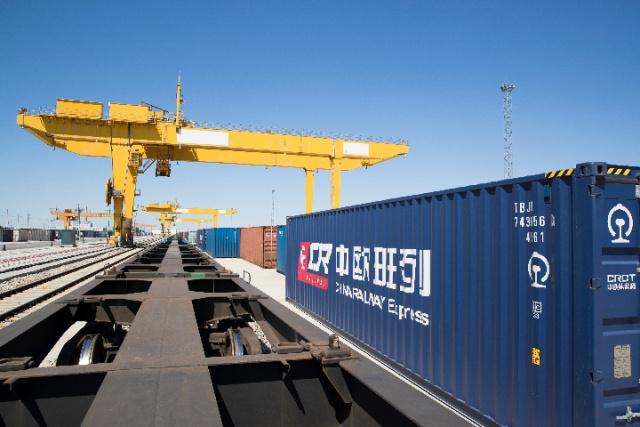


(Photo/Xinhua)
URUMQI, April 17 (Xinhua) -- On a highway in Horgos, drivers speaking different languages transport goods in and outside China. Meanwhile, China-Europe trains pass through customs and go directly into Kazakhstan, bringing vitality to the city that once thrived on the ancient Silk Road.
Positioned on the forefront of China's western areas, Horgos, a major land pass in northwest China's Xinjiang Uygur Autonomous Region, has seen robust increase in foreign trade. A total of 2,055 inbound and outbound China-Europe freight trains passed through Horgos Port last year.
Xinjiang borders eight countries and has a host of ports involved in international trade on the ancient Silk Road. The authorities have enhanced opening-up efforts in recent years amid the Belt and Road Initiative.
In the first month of this year, Xinjiang's total foreign trade stood at 13.94 billion yuan (about 2 billion U.S. dollars), up 11.7 percent year on year, according to Urumqi Customs.
Meanwhile, three comprehensive bonded zones, located in Xinjiang's Alataw Pass, Kashgar, and the regional capital Urumqi, saw their combined foreign trade value rising more than 40 percent year-on-year in January.
Last year, imports and exports between Xinjiang and 36 countries along the Belt and Road increased by 13.5 percent year-on-year to about 291.5 billion yuan.
Behind all the prosperity is the Belt and Road Initiative, which is gaining steam.
An international Belt and Road forum will be held in Beijing later this month, with representatives from over 100 countries, including about 40 government leaders, having confirmed their attendance. The forum is expected to boost people-to-people connectivity among countries participating in the development of the Belt and Road.
Over the past few years, China has signed 171 cooperation documents on the Belt and Road Initiative with more than 150 countries and international organizations.
In Xinjiang, the Kemen Noodle Manufacturing Co. Ltd., a major foreign trade company located within the comprehensive bonded zone in Urumqi, exported a total of 163 million yuan worth of products last year.
"The company will further expand production under the dual advantages of preferential policies and shortened customs clearance time," said the company's deputy general manager Wei Yujun.
Benefits of opening up in the region have extended beyond the economic sector.
In the past few months, many foreign officials and media delegates visited Xinjiang farmers, artists and people involved in religious affairs, as they got to know the region's opening-up efforts.
Senior diplomats from permanent missions of eight countries to the United Nations Office at Geneva visited Xinjiang from Feb. 16 to 19 at the invitation of the Chinese Ministry of Foreign Affairs.
The diplomats from Pakistan, Venezuela, Cuba, Egypt, Cambodia, Russia, Senegal and Belarus spoke with trainees at vocational education and training centers, teaching clerics and other members of the public during their visit.
Enhanced communication has also strengthened emotional bonding between people from China and its neighboring countries. In recent years, an increasing number of international students are pursuing education in Xinjiang.
In Xinjiang Normal University, Kazakhstani student Irbay Lahat is studying Chinese, calligraphy and martial arts with his classmates from countries such as Russia, Kazakhstan and Kyrgyzstan as a new semester started.
"Learning Chinese can help me find a better job in Kazakhstan," he said. "I want to pursue further education in another city in China after graduation."

 Award-winning photos show poverty reduction achievements in NE China's Jilin province
Award-winning photos show poverty reduction achievements in NE China's Jilin province People dance to greet advent of New Year in Ameiqituo Town, Guizhou
People dance to greet advent of New Year in Ameiqituo Town, Guizhou Fire brigade in Shanghai holds group wedding
Fire brigade in Shanghai holds group wedding Tourists enjoy ice sculptures in Datan Town, north China
Tourists enjoy ice sculptures in Datan Town, north China Sunset scenery of Dayan Pagoda in Xi'an
Sunset scenery of Dayan Pagoda in Xi'an Tourists have fun at scenic spot in Nanlong Town, NW China
Tourists have fun at scenic spot in Nanlong Town, NW China Harbin attracts tourists by making best use of ice in winter
Harbin attracts tourists by making best use of ice in winter In pics: FIS Alpine Ski Women's World Cup Slalom
In pics: FIS Alpine Ski Women's World Cup Slalom Black-necked cranes rest at reservoir in Lhunzhub County, Lhasa
Black-necked cranes rest at reservoir in Lhunzhub County, Lhasa China's FAST telescope will be available to foreign scientists in April
China's FAST telescope will be available to foreign scientists in April